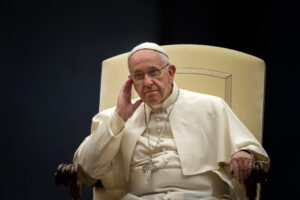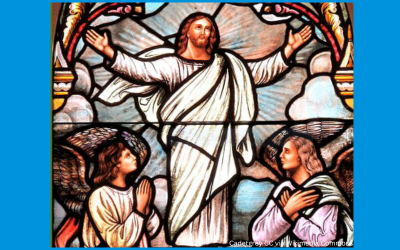In their Gospels Luke and John adopt two very different approaches, the one narrative, the other philosophical (before theology became a title in its own right). Luke sets out the story of Jesus from birth on earth to Ascension into heaven. This is the historical – as he stresses from the outset – version of the life of Jesus the compassionate prophet of God’s Kingdom, with an emphasis on the journey to Jerusalem, the denouement of his ministry and his death there on a cross, Resurrection and being raised up in glory by his going to God and heaven.
See also a Sunday Homily for the Solemnity of the Ascension HERE |
John tells the story of Jesus, not now from his birth but from the beginning, before the world came into being. This is the philosophical/theological – as he shows from the first line in the Prologue – view of Jesus the eternal Word, with an emphasis on the relationship between Jesus and God as one of Father and Son. The crucifixion of Jesus is a revelation of His glory, his Resurrection and Ascension showing the ‘seamless garment’ that shrouds Jesus throughout eternity.
Luke’s story is about the Son of Man, John’s about the Son of God. Today theologians would describe their different methods as being ‘from below’ and ‘from above’. They are not in conflict concerning facts but complementary in faith. Without the grounded account of Luke, the Gospel of John could be dismissed as mythology; without John the Gospel of Luke could be written off as just another account of an ancient miracle worker. Where Luke is pastoral, John is spiritual, both sides of the mission of Jesus continued in and by the Church through the Holy Spirit.
Two passages convey the complementarity of these two Gospels. Firstly, the Prologue from John (1:1-14) which proclaims the Word who has overcome the darkness of the world with its sinfulness; secondly, Luke’s story of the two disciples meeting Jesus on the way to Emmaus with its dramatic movement from darkness through shadow to light (24:13-35). The Eternal Word of God has joined the Risen Lord, the same Jesus who is both the ‘Light of the world’ and it’s Saviour. The Ascension is how God the Father looks on the Resurrection of His eternal Son entered into history but not enclosed by the limitation of human existence. However, very important aspects of the Ascension are the assurance that, while Christ is absent, the Holy Spirit is active in His name and the Lord will return, as we confess in the Creed, ‘He will come again in glory’ to give God’s judgement on all.
In today’s readings Luke, in the Acts of the Apostles, gives an account of the Lord’s Ascension into heaven. This is the penultimate moment of the Christ-event with mention of the ‘same Jesus’ returning to earth as he has departed. In the meantime Luke shows the evangelical and ecclesial equilibrium between the local and universal where the disciples who are ‘men from Galilee’ are appointed as apostles ‘to the ends of the earth’.
The Gospel – from Mark – is in keeping with the style throughout – short and simple – with the significant detail added – also incorporated into the Creed – the Risen Lord ’is seated at the right hand of the Father’.
It is Paul – in the Reading from Ephesians – who brings out the spiritual significance of this supreme act of ‘God the Father of glory’, receiving Jesus on His return, having ‘shown the strength of his power at work in Christ’, raising him from human death to reside in heaven. The Apostle to the Gentiles announces all the blessings available from Christ’s Ascension. Combining praise and petition, Paul proclaims faith in the person of Christ and hope through his placement in heaven. Therefore the Ascension is not an abstraction.
This Solemnity of the Ascension of the Lord is also World Communications Day. In his Message for this year Pope Francis treats a topic which we hear much talk about, Artificial Intelligence. He begins by mentioning that it has also been the theme of his Message for the World Day of Peace earlier in the year. At a time when systems of mass communications and social media are raising serious questions about truth and trust, context and content of communication(s), he speaks about the urgent need for wisdom in the world and situates the search for it in the human heart which is both a symbol of personal identity and integrity and ‘the inward place of our encounter with God’. After outlining the opportunity and obstacle, that is, the possibilities and pitfalls of the system of artificial intelligence, he calls again for an ‘international treaty that regulates the development and use of artificial intelligence in its many forms’, acknowledging that ‘at the same time, as in every human context, regulation is, of itself, not sufficient’. The ‘human context’ of information and communication, indeed formation, insists on calling for relationality and responsibility to be rooted in the seat of conscience and setting of community rather than in machines.

Pope Francis puts the choice clearly before and between people:
It is up to us to decide whether we will become fodder for algorithms or will nourish our hearts with that freedom without which we cannot grow in wisdom. Such wisdom matures by using time wisely and embracing our vulnerabilities. It grows in the covenant between generations, between those who remember the past and who look ahead to the future. Only together can we increase our capacity for discernment and vigilance and for seeing things in the light of their fulfilment. Lest our humanity lose its bearings, let us seek the wisdom that was present before all things (cf. Sir 1:4): it will help us also to put systems of artificial intelligence at the service of a fully human communication.[1]
The Ascension does not mean an absence of communication from heaven as if Christ were completely cut off from the world, even from the church. Thus the Ascension of Christ does not close a door but opens a window from earth onto heaven. Rather, it announces the advent of a new avenue, a universal one which no human platform, however technologically advanced, could supply or supplant. This is the wisdom which, while using human intelligence and sensibility well, enables individuals and institutions, including the church, as ‘a gift of the Holy Spirit, enables us to look at things with God’s eyes, to see connections, situations, events and to uncover their real meaning’. Pope Francis adds that ‘Without this kind of wisdom, life becomes bland, since it is precisely wisdom – whose Latin root ‘sapere’ is related to the noun sapor – that gives “savour” to life’.[2] Savouring this spiritual flavour is an important exercise and element of discernment.
Luke and John are brilliant communicators, Luke the storyteller, John more speculative. Luke’s presentation of Jesus as the prophet par excellence puts the focus on God’s Reign; John personifies the Gospel in Jesus. As prophet and Word of God Jesus is both messenger and message, guide and Gospel, singer and song in the same Spirit. The Communicator is the One communicated; the communicated is one and the same with the Communicator.
[1] MESSAGE OF HIS HOLINESS POPE FRANCIS FOR THE 58th WORLD DAY OF SOCIAL COMMUNICATIONS :Artificial Intelligence and the Wisdom of the Heart: Towards a Fully Human Communication.
[2] Idem.
To read the text of Pope Francis Message for World Day of Social Communications 2024 CLICK HERE

